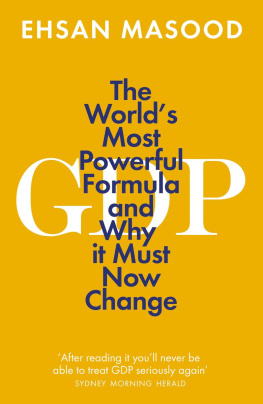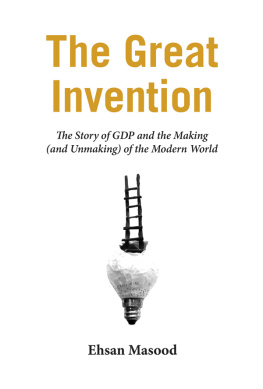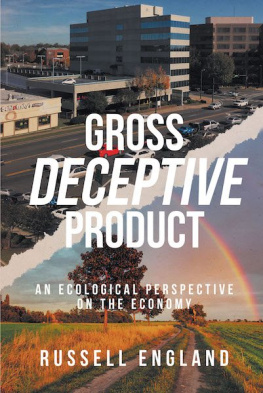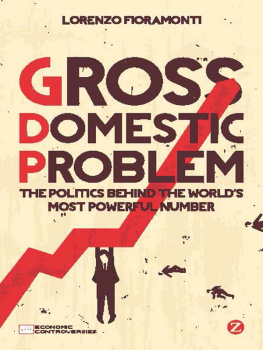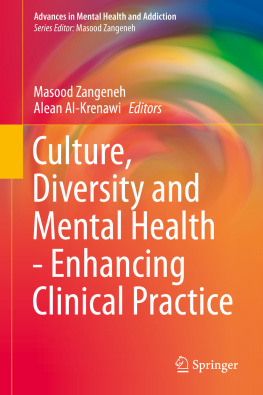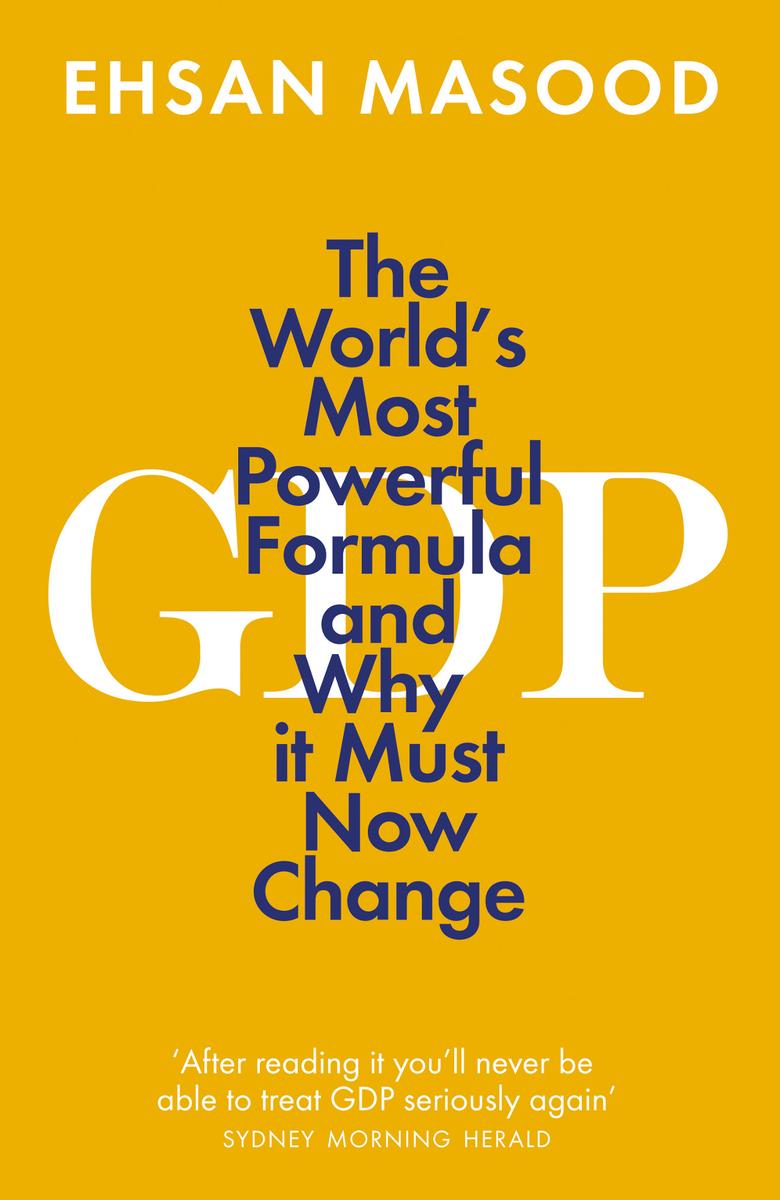
Praise for the first edition
If you ever thought that economic policy could never make for gripping drama, try reading this book.
Khurram Husain, Dawn
Masood covers decades of challenges to GDP conventions that make for a fascinating institutional and human story.
Diane Coyle, Nature
Masoods highly readable book is a useful reminder of what GDP is and what it isnt.
N. Gregory Mankiw, Science
Ehsan Masood unveils the genesis of GDP and how it shaped the modern economic paradigm. It comes at a time when a growing number of people are questioning this flawed metric.
Down to Earth
Fascinating. Whether happiness should be embedded into decisions on the economy is an important one, and whether GDP should be abandoned in favor of something better is too. Masoods book helps raise those questions and others in a thought provoking manner. Thats much needed in every endeavor these days, and needed in few places more than in the economics profession.
Simon Constable, Forbes
In lively prose, Masood argues that GDP is flawed because it ignores volunteering, housework, environmental degradation, job satisfaction, and income inequality.
Kirkus Reviews
ii An interesting book. Masood doesnt merely criticize the overreliance on GDP: he also explores ongoing efforts to develop a satisfactory substitute or supplement that would yield a more accurate picture of economic activity and its effects.
Foreign Affairs
Masood contends that GDP is a bill of goods the developed world foisted on emerging nations. It is flawed, he argues, because the monetary value of all goods and services produced in a country makes no reference to social well-being or inequality. Masood is also troubled by GDPs failure to consider the environmental damage that is, at times, a byproduct of growth. Many of Masoods criticisms have merit. He presents some interesting alternatives. He favors revolutionary change.
Roger Lowenstein, Wall Street Journal
After reading it youll never be able to treat GDP seriously again.
Nicholas Stuart, Sydney Morning Herald
An important and interesting book that shows how trapped we have become by the idea of Gross Domestic Productand reveals how important it is to develop alternatives that will help us reduce inequality and respond to climate change.
Kate E. Pickett, PhD, Professor of Epidemiology at the University of York and co-author of The Spirit Level: Why Equality is Better for Everyone
The writing is effortless and intriguing. Like a novel, it weaves personal stories and the significance of individuals into a narrative about tectonic shifts in world politics.
Maria Ivanova, Associate Professor of Global Governance at the University of Massachusetts Boston, and author of The Untold Story of the Worlds Leading Environmental Institution: UNEP at Fifty
v
In memory of
Mahbub ul Haq
(19341998)
Contents
T he world of 2021 seems barely recognizable from 2016 when the first edition of this book (under its original title The Great Invention), was published in the United States.
As I write this (at the start of 2021), the coronavirus pandemic has taken close to 2 million lives and infected nearly 100 million people, and continues to decimate economies. Most of the world, with the exception of East Asia, is in some form of lockdown. Hundreds of millions, especially the lowest-paid workers in service industries, have become jobless. City-center offices lie empty. Hospitals are struggling to cope. Children are forced to stay at home while schools remain closed.
Although vaccines have arrived, it will take at least two years to vaccinate the world. In the meantime, the International Monetary Fund estimates a fall in global Gross Domestic Product (GDP) of more than 4 percent during 2020, a level of drop not x seen for at least a century. So many of the gains that have been made in lifting the poorest out of poverty stand at risk of being wiped out.
GDP is a count of a nations economic activity. It is calculated by a countrys national statistical office and includes what consumers spend in the shops, and what businesses and governments invest. GDP is a highly technical process, but eagerly anticipated and followed by a much wider group of non-specialists, including politicians and the public, along with economists, financial analysts, fund managers, and the media. The quarterly announcement of the latest data ranks as one of the great rituals of modern economic and political life. If GDP is more than in the previous three months, governments breathe a sigh of relief, but if GDP drops, or if even if it stays the same, the result can, potentially, be terminal for whoever is in power.
With economies in freefall, that is the pressure every government is now under. To boost economic activityand therefore GDPmany countries leaders have turned to the 1940s playbook of the English economist John Maynard Keynes (see
But there are important differences between todays world and that of Keynes. Todays industrial development must be weighed against environmental costs. The industrialization of the past few centuries has pumped enough carbon dioxide into the atmosphere to put the world on track to dangerous global warming. At xi the same time, a sixth mass extinction
All of this means that economic recovery needs to be greener if climate change, biodiversity loss and future pandemics are to be avoided. But the problem with measuring economic activity using GDP is that it rewards traditional, fossil fuel-powered economic development. In contrast, greener development takes longer and cannot be achieved in the time it takes for governments to sanction what are called shovel-ready projects that can deliver faster growth. Faced with this choice, most governments are opting for the more traditional route: roads, housing developments, airports are all being green-lighted, regardless of whether the means to achieve development are credible, or sustainable.
Researchers increasingly are questioning whether GDP is fit for purpose: if the world is at risk of ecological grief, why are we still following its formula, they rightly ask.
In The Value of Everything, Mariana Mazzucato of University College London illustrates how GDP incentivizes those economic sectors that will push the index ever higher, regardless of whether they are causing planetary harm, or widening inequality.
Meanwhile, Diane Coyle of the University of Cambridge and Benjamin Mitra-Kahn of Australias Intellectual Property Office have a two-step proposal. Firstly, to amend GDP by incorporating what it currently undervalues
A joint USChina team of researchersZhiyun Ouyang of the Chinese Academy of Sciences, Gretchen Daily of Stanford xii University, and Jack Liu of Michigan State Universityhave been involved in implementing a concept they call Gross Ecosystem Product,
The critiques will continue, and in time it is possible that the idea of running an economy from a single number will be replaced. But this is unlikely to happen soon. An important reason for that is the ascent of China as a world power; a second reason is that change needs international agreement.
Chinas peoples are ready to reclaim their place as members of a respected world civilizationescaping the yoke of what they have long called their century of humiliation at the hands of the Western powers through wars and colonization. When judged by GDP, China is currently second only to the United States, and researchers are projecting that the country will take the top spot and become the worlds richest economy inside the present decade. Chinas statisticians are unlikely to agree a wholesale change of the rules before that happens.

